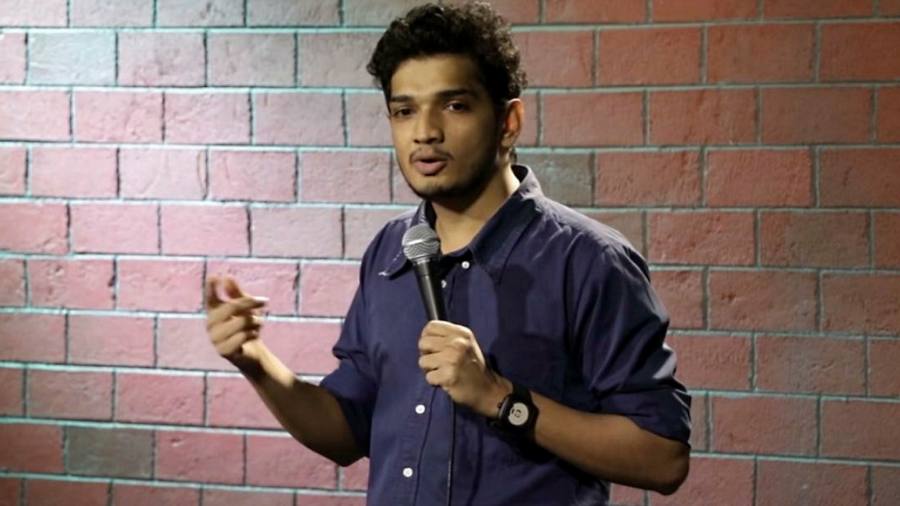[ad_1]
A young stand-up comic with an infectious grin, Munawar Faruqui has made a name for himself on India’s comedy circuit in recent years by delivering sharp-edged satire with a boyish, unassuming stage presence.
Yet along with appreciative fans, the millennial Muslim comedian also caught the attention of Hindu zealots, who resent his casual references to Hindu deities, allusions to deadly anti-Muslim riots and barbs about leaders of the ruling Bharatiya Janata party.Â
In Prime Minister Narendra Modi’s “New Indiaâ€, such irreverence can carry a heavy price. On New Year’s Day in the prosperous city of Indore, Faruqui was beginning a show when Hindu vigilantes, led by the son of a BJP state legislator, disrupted the performance and hustled him off to a police station.
Faruqui, 30, and four other comics were arrested on charges of violating a British colonial-era law that makes it a criminal offence to “deliberately outrage the religious feelings of any communityâ€.
For the next 36 days, Faruqui sat in jail, his bail application thrice rejected by lower courts, with one judge declaring it is “the constitutional duty of every citizen to promote brotherhood and harmonyâ€.
He was finally freed late on Saturday night, more than 36 hours after India’s Supreme Court ordered he be granted bail. But the ordeal of the young comic — whose family home was destroyed in Gujarat’s 2002 communal riots — is far from over.
Faruqui now faces a protracted legal battle fighting criminal charges in both Madhya Pradesh and Uttar Pradesh, a state ruled by the radical Hindu cleric Yogi Adityanath, a BJP stalwart. His fellow comics remain in jail.
Even if he is acquitted, Faruqui’s travails send a chilling message to other comedians — especially those from India’s Muslim minority — planning to riff on India’s contemporary politics or social life. They joke at their peril, as the ruling party and its zealous Hindu supporters are watching.
India’s many sweeping colonial-era criminal statutes — which make it a crime to deliberately offend people’s religious feelings or promote enmity between communities — give authorities plenty of legal tools to apply pressure on critical voices.
“Faruqui’s case shouldn’t be seen in isolation,†says Akash Banerjee, a popular political satirist. “It is part of the gradual creeping control over any sort of dissent. Today, talking about religion is off the table. Tomorrow, criticising any politician will be off the table because in India, politicians are demigods.â€
Comics aren’t the only ones feeling the heat. Police in five BJP-ruled states have filed criminal charges against a senior Indian executive from Amazon’s video streaming services and a clutch of Bollywood film personalities over a scene in a new Amazon Prime mini-series, Tandav, in which students in a college play portray Hindu gods discussing politics.
Though the scene was deleted after an uproar, the Supreme Court rebuffed the filmmakers’ plea for protection from arrest, saying their constitutional right to free speech did not extend to hurting people’s religious feelings.
In court, actor Mohammed Zeeshan Ayyub, who played a student acting the part of Lord Shiva, argued he should not be punished for dialogue uttered while in character. But Judge MR Shah — who has praised Modi as India’s “most popular, loved, vibrant and visionary leader†— disagreed, saying the actor had read the script before signing up for the role.
Journalists are also under fire, with three BJP-ruled states filing charges of sedition and instigation of violence against a clutch of prominent journalists and Congress party parliament member Shashi Tharoor for tweets — whose accuracy was later contested — about the death of a farmer in recent protests.
Taken together, the recent flurry of high-profile legal cases are a stark warning to Indian public figures, including in the media and the arts, about the potential price of sharp political critique.
“One has to be very careful in the times in which we live,†says Banerjee. “Everything can be misconstrued. The law book is open for anyone to misuse.â€
[ad_2]
Source link






